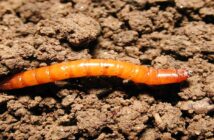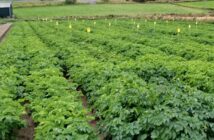Scottish potato growers are urged to remain vigilant against soft rots this storage period, with appropriate ventilation and meticulous hygiene key to avoid spread in seed and ware crops.
A relatively dry June and July meant mother tubers lasted longer than they typically would before breaking down to Pectobacterium infection – the principal cause of soft rots – during the 2023 growing season.
When wetter weather did set in and trigger breakdown, tubers were already well-developed in the ridge, increasing the risk of the problem spreading during storage.
SAC Consulting potato specialist Kyran Maloney says there have been some reports of late blackleg in seed and ware crops towards the end of the growing season.
Recent storms have compounded the threat where potatoes still await harvest. He says assessing risk by hotboxing tuber samples is advised and there are tests available at plant clinics to establish the bacterial loading on tubers post-harvest.
Where risky stocks are identified, immediate and judicious ventilation to dry the crop and desiccate any rotten tubers that may already be breaking down is key.
A rapid temperature pulldown is also important if the risk of condensation is well-managed.
“Growers should resist the temptation to pick any rots off early, as this will spread any bacterial infection through the crop when put over a grading line.
“Only once soft rotting tubers have been mummified with ventilation should they be graded out,” warns Mr Maloney.
For seed producers, first grading over the next month offers an opportunity to split crops into seed fractions and further assess potential disease issues.
Storage disease treatments like Gavel (imazalil) should be applied in seed crops at this stage where risk of fungal storage diseases like dry rot, skin spot or gangrene is identified.
Unfortunately, seed treatments are not effective against the bacteria that cause soft rots, so if there is a high risk, introducing moisture by applying a fungicide may do more harm than good, explains Kyran.
He adds that hygiene is paramount during grading to avoid additional spread of bacterial soft rots before seed reaches customers in the spring.
“Cleaning the grading line as often as possible with a disinfectant like Jet 5 (peroxyacetic acid) will avoid making any problems worse.
“Clearly, it’s impossible to disinfect between every stock, but even a little more attention to cleanliness will make a difference.
“It’s particularly important to clean down after an infected stock has passed through, starting with a clean slate before the next one is processed.”
Start seed orders early
Finally, Mr Maloney urges all potato growers to start high grade seed procurement early this year, as high virus vector pressure and recent stormy weather may result in tight supplies for some varieties for spring 2024.
“Have those conversations now and it will ensure there are no last-minute surprises ahead of planting.”




